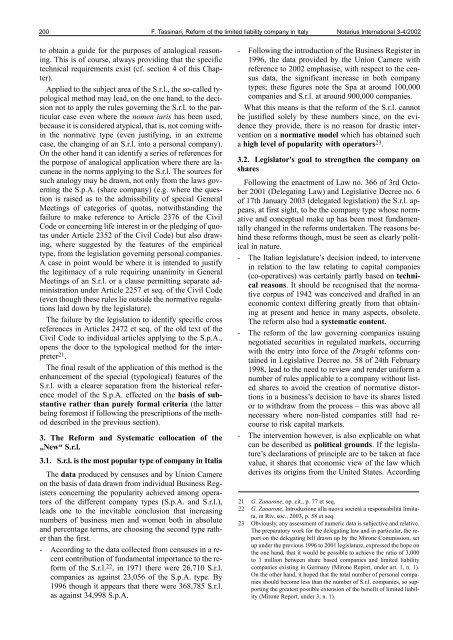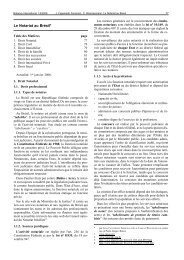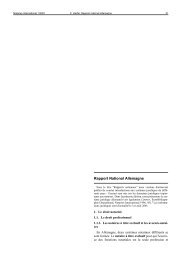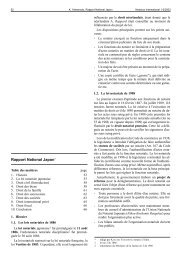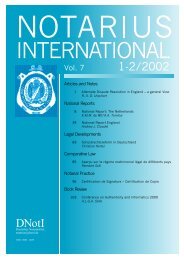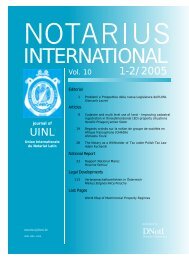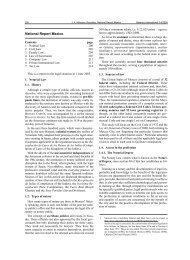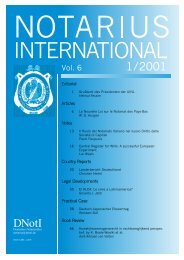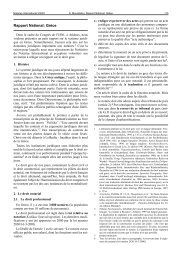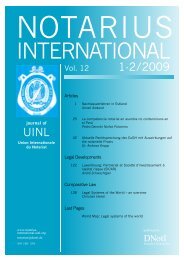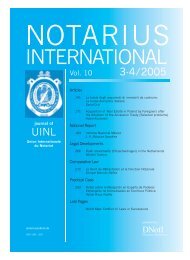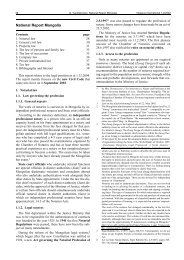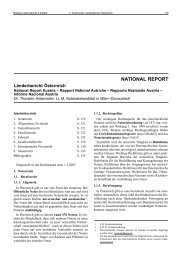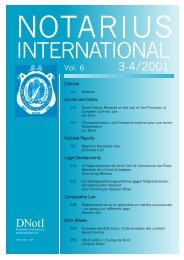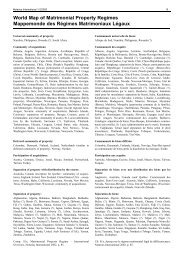ARTICLES and NOTES - Notarius International
ARTICLES and NOTES - Notarius International
ARTICLES and NOTES - Notarius International
You also want an ePaper? Increase the reach of your titles
YUMPU automatically turns print PDFs into web optimized ePapers that Google loves.
200 F. Tassinari, Reform of the limited liability company in Italy <strong>Notarius</strong> <strong>International</strong> 3-4/2002<br />
to obtain a guide for the purposes of analogical reasoning.<br />
This is of course, always providing that the specific<br />
technical requirements exist (cf. section 4 of this Chapter).<br />
Applied to the subject area of the S.r.l., the so-called typological<br />
method may lead, on the one h<strong>and</strong>, to the decision<br />
not to apply the rules governing the S.r.l. to the particular<br />
case even where the nomen iuris has been used,<br />
because it is considered atypical, that is, not coming within<br />
the normative type (even justifying, in an extreme<br />
case, the changing of an S.r.l. into a personal company).<br />
On the other h<strong>and</strong> it can identify a series of references for<br />
the purpose of analogical application where there are lacuneae<br />
in the norms applying to the S.r.l. The sources for<br />
such analogy may be drawn, not only from the laws governing<br />
the S.p.A. (share company) (e.g. where the question<br />
is raised as to the admissibility of special General<br />
Meetings of categories of quotas, notwithst<strong>and</strong>ing the<br />
failure to make reference to Article 2376 of the Civil<br />
Code or concerning life interest in or the pledging of quotas<br />
under Article 2352 of the Civil Code) but also drawing,<br />
where suggested by the features of the empirical<br />
type, from the legislation governing personal companies.<br />
A case in point would be where it is intended to justify<br />
the legitimacy of a rule requiring unanimity in General<br />
Meetings of an S.r.l. or a clause permitting separate administration<br />
under Article 2257 et seq. of the Civil Code<br />
(even though these rules lie outside the normative regulations<br />
laid down by the legislature).<br />
The failure by the legislation to identify specific cross<br />
references in Articles 2472 et seq. of the old text of the<br />
Civil Code to individual articles applying to the S.p.A.,<br />
opens the door to the typological method for the interpreter<br />
21 .<br />
The final result of the application of this method is the<br />
enhancement of the special (typological) features of the<br />
S.r.l. with a clearer separation from the historical reference<br />
model of the S.p.A. effected on the basis of substantive<br />
rather than purely formal criteria (the latter<br />
being foremost if following the prescriptions of the method<br />
described in the previous section).<br />
3. The Reform <strong>and</strong> Systematic collocation of the<br />
„New“ S.r.l.<br />
3.1. S.r.l. is the most popular type of company in Italia<br />
The data produced by censuses <strong>and</strong> by Union Camere<br />
on the basis of data drawn from individual Business Registers<br />
concerning the popularity achieved among operators<br />
of the different company types (S.p.A. <strong>and</strong> S.r.l.),<br />
leads one to the inevitable conclusion that increasing<br />
numbers of business men <strong>and</strong> women both in absolute<br />
<strong>and</strong> percentage terms, are choosing the second type rather<br />
than the first.<br />
- According to the data collected from censuses in a recent<br />
contribution of fundamental importance to the reform<br />
of the S.r.l. 22 , in 1971 there were 26,710 S.r.l.<br />
companies as against 23,056 of the S.p.A. type. By<br />
1996 though it appears that there were 368,785 S.r.l.<br />
as against 34,998 S.p.A.<br />
- Following the introduction of the Business Register in<br />
1996, the data provided by the Union Camere with<br />
reference to 2002 emphasise, with respect to the census<br />
data, the significant increase in both company<br />
types; these figures note the Spa at around 100,000<br />
companies <strong>and</strong> S.r.l. at around 900,000 companies.<br />
What this means is that the reform of the S.r.l. cannot<br />
be justified solely by these numbers since, on the evidence<br />
they provide, there is no reason for drastic intervention<br />
on a normative model which has obtained such<br />
a high level of popularity with operators 23 .<br />
3.2. Legislator's goal to strengthen the company on<br />
shares<br />
Following the enactment of Law no. 366 of 3rd October<br />
2001 (Delegating Law) <strong>and</strong> Legislative Decree no. 6<br />
of 17th January 2003 (delegated legislation) the S.r.l. appears,<br />
at first sight, to be the company type whose normative<br />
<strong>and</strong> conceptual make up has been most fundamentally<br />
changed in the reforms undertaken. The reasons behind<br />
these reforms though, must be seen as clearly political<br />
in nature.<br />
- The Italian legislature’s decision indeed, to intervene<br />
in relation to the law relating to capital companies<br />
(co-operatives) was certainly partly based on technical<br />
reasons. It should be recognised that the normative<br />
corpus of 1942 was conceived <strong>and</strong> drafted in an<br />
economic context differing greatly from that obtaining<br />
at present <strong>and</strong> hence in many aspects, obsolete.<br />
The reform also had a systematic content.<br />
- The reform of the law governing companies issuing<br />
negotiated securities in regulated markets, occurring<br />
with the entry into force of the Draghi reforms contained<br />
in Legislative Decree no. 58 of 24th February<br />
1998, lead to the need to review <strong>and</strong> render uniform a<br />
number of rules applicable to a company without listed<br />
shares to avoid the creation of normative distortions<br />
in a business’s decision to have its shares listed<br />
or to withdraw from the process – this was above all<br />
necessary where non-listed companies still had recourse<br />
to risk capital markets.<br />
- The intervention however, is also explicable on what<br />
can be described as political grounds. If the legislature’s<br />
declarations of principle are to be taken at face<br />
value, it shares that economic view of the law which<br />
derives its origins from the United States. According<br />
21 G. Zanarone, op. cit., p. 77 et seq.<br />
22 G. Zanarone, Introduzione alla nuova società a responsabilità limitata,<br />
in Riv. soc., 2003, p. 58 et seq.<br />
23 Obviously, any assessment of numeric data is subjective <strong>and</strong> relative.<br />
The preparatory work for the delegating law <strong>and</strong> in particular, the report<br />
on the delegating bill drawn up by the Mirone Commission, set<br />
up under the previous 1996 to 2001 legislature, expressed the hope on<br />
the one h<strong>and</strong>, that it would be possible to achieve the ratio of 3,000<br />
to 1 million between share based companies <strong>and</strong> limited liability<br />
companies existing in Germany (Mirone Report, under art. 1, n. 1).<br />
On the other h<strong>and</strong>, it hoped that the total number of personal companies<br />
should become less than the number of S.r.l. companies, so supporting<br />
the greatest possible extension of the benefit of limited liability<br />
(Mirone Report, under 3, n. 1).


